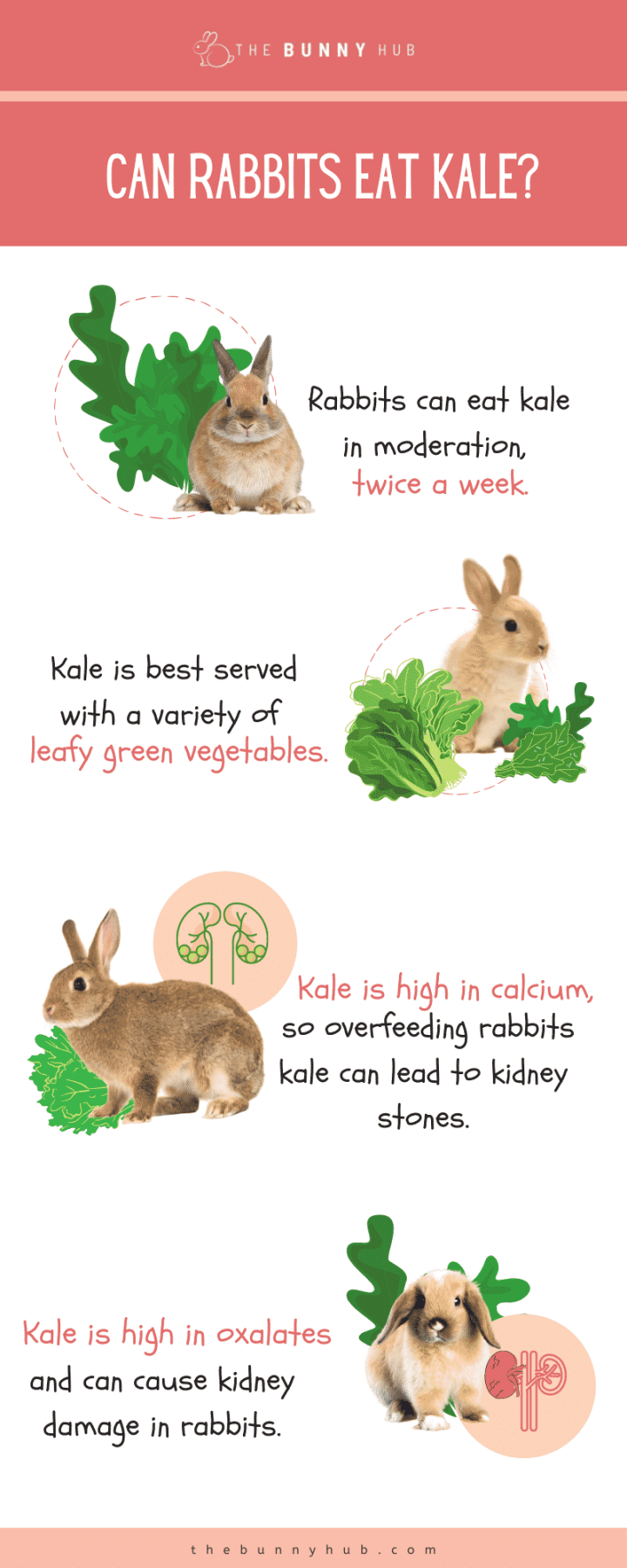Can Rabbits Have Kale?
Many pet owners are often curious about what foods are safe to feed their rabbits. One vegetable that often comes to mind is kale. But can rabbits have kale? Let’s explore whether kale is a suitable addition to a rabbit’s diet.

What is Kale?
Kale is a leafy green vegetable that belongs to the Brassica oleracea family, which also includes other vegetables like broccoli, cabbage, and cauliflower. It is known for its dark, green leaves and is widely recognized as a nutritional powerhouse.
Is Kale Safe for Rabbits to Eat?
The short answer is yes, rabbits can eat kale. However, it should be given in moderation and as part of a diverse and balanced diet. Kale contains various essential nutrients that can benefit a rabbit’s health, but it should not be the sole focus of their diet.
The Benefits of Feeding Kale to Rabbits
Kale offers several health benefits for rabbits when fed in appropriate quantities:
- Vitamins and Minerals: Kale is rich in vitamins A, C, and K, as well as minerals like calcium and potassium. These nutrients are essential for a rabbit’s overall well-being and can contribute to a healthy immune system, strong bones, and proper organ function.
- Fiber: Kale is an excellent source of dietary fiber, which is vital for a rabbit’s digestive health. The fiber in kale can help prevent gastrointestinal problems and maintain healthy gut motility.
- Hydration: Kale has a high water content, which can contribute to a rabbit’s hydration levels. This is particularly important for rabbits since they have a low thirst drive and obtain most of their water from the foods they eat.
Potential Risks of Feeding Kale to Rabbits
While kale can be a nutritious addition to a rabbit’s diet, there are some potential risks to be aware of:
- Oxalic Acid: Kale contains a moderate amount of oxalic acid, which can inhibit calcium absorption and potentially lead to the formation of bladder stones in rabbits. Too much kale, especially in rabbits prone to bladder problems, can be harmful. It is important to feed kale in moderation to avoid these issues.
How to Feed Kale to Rabbits
When introducing kale to a rabbit’s diet, it is essential to follow these guidelines:
- Start Slowly: Begin by offering small amounts of kale. This will allow the rabbit’s digestive system to adjust to this new food item.
- Monitor for Digestive Issues: Keep an eye on your rabbit’s stool consistency and overall behavior when introducing kale. If you notice any digestive upset, such as diarrhea or decreased appetite, discontinue feeding kale and consult a veterinarian.
- Feed Variety: Kale should be part of a varied diet that includes other leafy greens, hay, and limited amounts of pellets. A diverse diet is crucial for meeting a rabbit’s nutritional needs.
- Wash Thoroughly: Before feeding kale, ensure that it is thoroughly washed to remove any pesticides or dirt that may be present on the leaves.
Frequently Asked Questions (FAQs)
1. Can rabbits eat kale every day?
No, rabbits should not eat kale every day. While kale has nutritional benefits, it is important to feed it in moderation and alongside other vegetables to provide a balanced diet.
2. How much kale can I feed my rabbit?
A general guideline is to offer about 1 cup of fresh kale per 2 pounds of body weight per week. It is crucial to monitor your rabbit’s response to kale and adjust the quantity accordingly.
3. Are there any alternatives to kale for rabbits?
Yes, there are several other vegetables that rabbits can enjoy, such as romaine lettuce, spinach, cilantro, and parsley. These greens also provide essential nutrients and can be part of a varied diet.
4. Can rabbits eat kale stems?
Yes, rabbits can eat kale stems. However, the stems may be tougher and less appealing to rabbits compared to the leaves. It is preferable to offer the leaves, but the stems are safe for consumption if your rabbit enjoys them.
In conclusion, kale can be included in a rabbit’s diet as part of a diverse and balanced meal plan. It offers various essential nutrients but should be fed in moderation due to its oxalic acid content. As with any dietary changes, it is crucial to monitor your rabbit’s response and consult a veterinarian if you have any concerns.
Related Articles…
Copyright Notice:
All images on this website are obtained from the internet and remain copyrighted to their original owners. If you hold copyright to any image and want it taken down, please reach us.